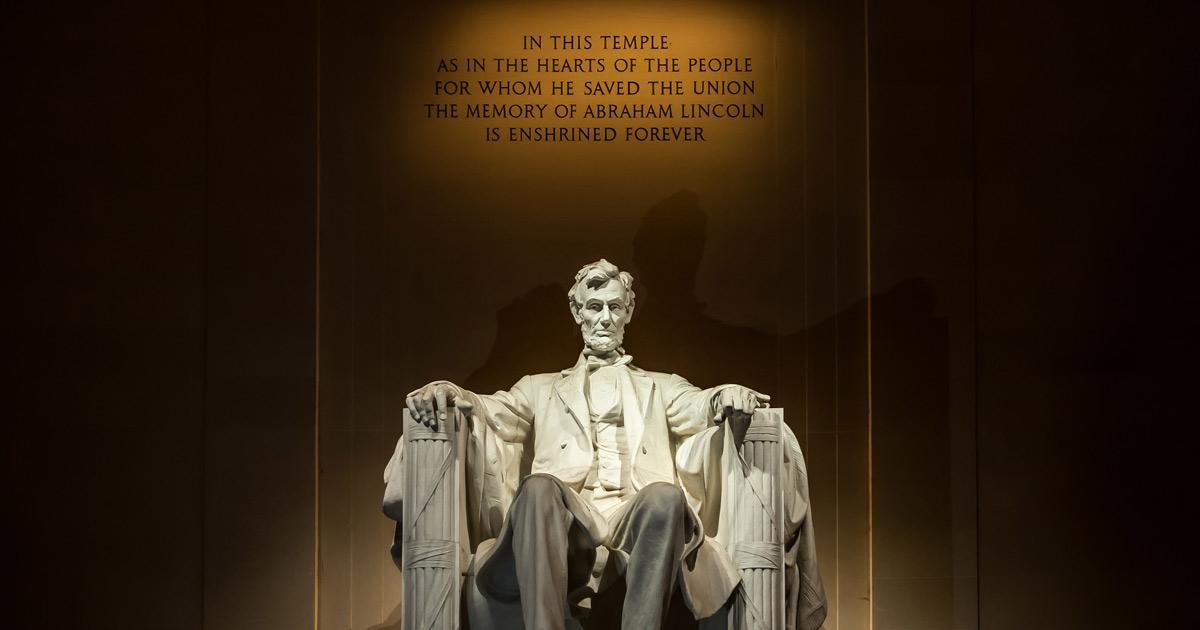
The Purpose of Political Demigods like Lincoln and the “Founding Fathers”
Crisis of the Two Constitutions: The Rise, Decline, and Recovery of American Greatness
by Charles R. Kesler
Encounter Books, 2021
xviii + 451 pp.
Charles Kesler, a professor of government at Claremont McKenna College and editor of the Claremont Review of Books, has presented in this important new book a carefully conceived interpretation of the Constitution and, more generally, of what he calls the “American regime.” As we shall see, this phrase is crucial to understanding the differences between his way of looking at political philosophy and that of Murray Rothbard and his followers.
Kesler has been heavily influenced in his account by Harry Jaffa, and, as I have written critically of Jaffa, readers may fear (or hope) that my review of this book will be a mere diatribe. But there is in fact much to admire in the book, and though I haven’t changed my opinion of Jaffa, he was not altogether wrong. To the contrary, he was certainly right to stress the importance of the clauses in the Declaration of the Independence that declare that all men “are endowed by their Creator with certain unalienable Rights, that among these are Life, Liberty, and the pursuit of Happiness.” He also correctly saw slavery as a grievous infringement of these rights. Rothbard agreed; it should not be forgotten that he strongly supported the pre–Civil War abolitionists.
That said, Kesler’s, and behind him Jaffa’s, account of rights is not altogether the same as Rothbard’s. Kessler says, “A rational animal should not be treated as if it were irrational; a man, as we say, should not be treated like a dog. Or, as Thomas Jefferson expressed it in one of his last letters … ’the mass of mankind has not been born with saddles on their backs, nor a favored few booted and spurred, ready to ride them legitimately, by the grace of God’” (p. 45; Jefferson here adopted the phrasing of Algernon Sidney [p. 18]).
Readers may be inclined to take this to be equivalent to Rothbard’s self-ownership principle, but in fact it is not. The statement does not forbid rule by one person over another. It says, or rather seems to say, only that a person cannot rule over another as a person can rule over an animal but leaves open rule of a less extreme character by some over others. And we need to go further. The statement does not actually say even this much. It says only that people are not born unequal, not that they cannot in the course of their lives become so unequal that some may rule over others as a man may rule over a dog.
It is apparent from other passages in the book that the concerns just raised are by no means imaginary. Kesler says, “The fathers of our republic are our demi-gods, as Thomas Jefferson, of all people, called them. They are our heroes, who establish the sacred space of American politics, and citizens (and those who would be) are expected to share a general reverence for them and their constitutional handiwork” (p. 364; see also a similar statement on p. 28). Lincoln, if anything, ranks even higher. Appealing to his mentor, Kesler says that in “Lincoln’s character, Jaffa argued, both ‘the giant’s strength’ and an incredible moderation in the use of it reached their consummation. He quoted with approval Clinton Rossiter’s famous eulogy: ‘Lincoln is the supreme myth, the richest symbol in the American experience. He is, as someone has remarked neither irreverently nor sacrilegiously, the martyred Christ of democracy’s passion play’” (p. 128). Whatever the limits of their rule, these Übermenschen surely are not viewed as on the same level as the rest of us Americans.
Why do we need such heroes? The answer takes us to the heart of Kesler’s constitutional project. If, for some libertarians, “it usually begins with Ayn Rand,” for Kesler it begins with Numa Denis Fustel de Coulanges, the great nineteenth-century French historian of the ancient city. He argued that in the classical world, citizens regarded the city in which they lived as founded by a god or a human founder of quasi-divine significance. Religion and the state did not compete for the citizens’ loyalty. The state was the sole object of their devotion, and they were willing to die for it. But Christianity, a universal religion not confined to one state or people, changed all that. Now, for believers in the new religion, something stood higher than the state, and this raised a problem. How can people be induced to die for the state? This is what Spinoza, and after him Leo Strauss, called the “theological-political problem” (p. 90). The answer for Kesler lies in the veneration of the “fathers of the republic,” our founders, and the constitution they gave to us; if I had to single out one word as key to the book’s message, it would be “founding.” Fustel, in pointing to the weakening in loyalty to the state brought about by Christianity, echoes arguments made by Niccolò Machiavelli and Jean-Jacques Rousseau, and the remedy for the supposed failing urged on us by Kesler resembles Rousseau’s “civil religion.” (See my review of a similar proposal by Walter Berns. By the way, contrary to what the index suggests, “Fustel” is the initial part of the last name “Fustel de Coulanges,” not a first name [p.440]) Citizens in this scheme of things are free to believe in Christianity, Judaism, or any other faith that acknowledges the natural law morality inculcated by the state, and the state will not interfere with these religions, so long as they do not teach anything opposed to the state’s basic doctrines. “Washington’s point is that the ‘right of conscience’ cannot command anything contrary to the conscience which monitors and embodies the natural law. The right of conscience itself being one of man’s natural rights, it has to be exercised consistently with the rest of them. The same point may be expressed in religious terms: new revelations cannot repeal or contradict the basic moral commandments of the Bible” (p. 90; these commandments, it should be noted, are to be understood as interpreted by Washington and the other founders of our regime).
The word “regime,” as I have said before, is, like “founding,” a key term for understanding the book. Kesler interprets the American founders to have had an understanding of “regime” like that of the ancients; it is “political, understanding American life to be organized, finally and no matter how indirectly, by the ‘regime,’ by a structure of authoritative principles, institutions, and types of character” (p. 11). The main error of “libertarian conservatives” is that they do not see the importance of the regime, taken in this sense. Writing of the “fusionist” Frank Meyer, he says, “For philosophical support, Meyer leaned on Aristotle, who … had actually maintained that virtuous acts had to be voluntary, and thus that virtue (Meyer claimed) could not be cured by state action. Yet Aristotle’s contention depended on a factor that Meyer downplayed or ignored, namely, that moral virtue is a kind of habit…. By rewarding just and punishing unjust actions, the law compels and teaches at the same time” (pp. 323–24).
The role that Kesler assigns to the prudence of wise statesmen undermines the contrast, fundamental to the book, between two Constitutions. The first, the founders’ Constitution, is based on the natural rights of the Declaration of Independence. The second, introduced by Woodrow Wilson and continued by Franklin Roosevelt and his leftist successors, replaces nature with history. Kesler gives an excellent account of Wilson, who rejected the allegedly mechanical “Newtonian” constitution of the founders, replacing it with a Darwinian organic, or “living,” constitution that led to a government run by an administrative elite of scientific experts. But Kesler’s first Constitution does not give us genuine natural rights; in it, the wise men who rule over us are called “statesmen” rather than “administrators,” but we are still bereft of liberty.
Kesler, like many followers of Leo Strauss, is a painstaking textual analyst, and one can only admire his careful account of “Federalist No. 10,” showing, against Martin Diamond and others, that “Publius” defends the role of the government in promoting virtue. Unfortunately, he for the most part confines himself to expounding the texts he regards as classics, rather than defending the truth of the views he attributes to them; we are apparently to take it as given that if “Publius” tells us something, we would do well to listen.
When Kesler addresses philosophical texts that do not concern politics, the result is sometimes unfortunate. He says, “In early modern philosophy, the problem was how to connect the consciousness or ego (res cogitans) with the external world (res extensa), given the radical separation between them introduced by Descartes for the sake of liberating man from his tutelage to nature or God. Only if man were alone with his own thoughts—not bound by his place in nature or his communion with God—could he originate and so test his own concepts as to be certain of his knowledge” (p. 36, emphasis in original). Descartes, far from wanting to liberate man from God, argues that a proof of God is necessary to show that our clear and distinct ideas, including our ideas of the external world and of other minds, are true. (I am aware of interpretations of Descartes similar to Kesler’s by other writers, e.g., Richard Kennington and Hiram Caton, but they seem to me quite frankly perverse.)
Kesler is also in error in claiming some comments by Frederick Douglass about the Constitution, made by him in 1860, to concern that document’s ratification. As will be apparent if you read the quotation from Douglass, the remarks concern the then contemporary secession crisis (p. 429n14).
Those of us so benighted as not to wish to die for the state at all will reject the simulacrum of natural rights that Kesler offers and will instead prefer the genuine article, which does not require us to worship strange gods in the guise of “Founders.”



